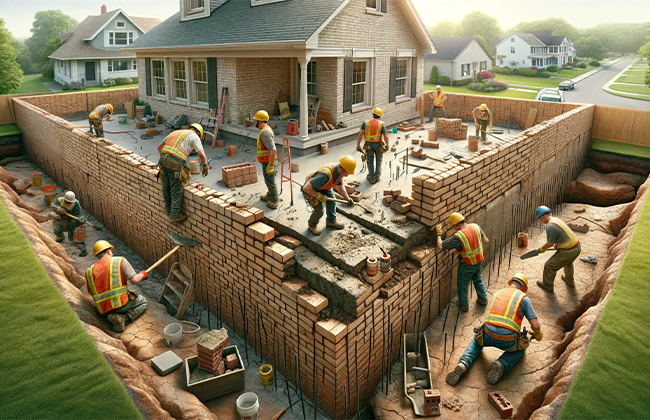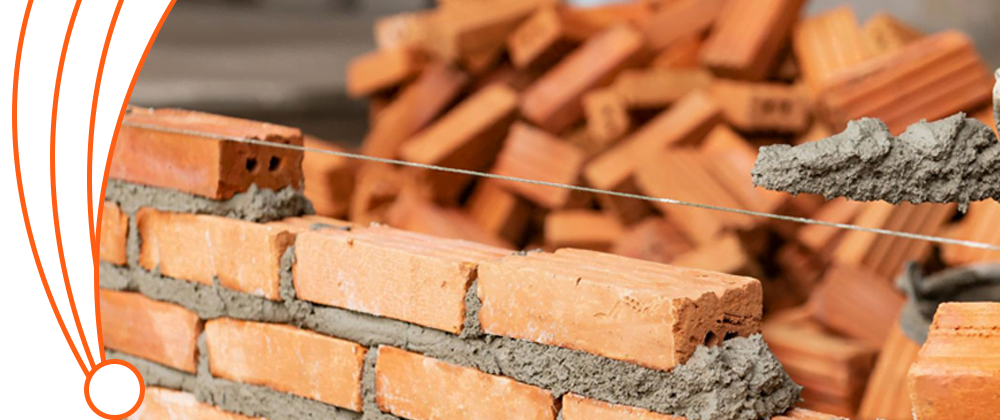Brick foundation repair is an essential aspect of maintaining your home’s structural integrity. It involves diagnosing and addressing issues like cracks, settling, or moisture damage, which can compromise the foundation’s stability. Timely intervention can prevent future costly damage, ensuring the safety and longevity of your property. This comprehensive guide will offer homeowners valuable insights into recognizing, addressing, and preventing common foundation problems.
Table of Contents
Understanding Brick Foundation Repair
Brick foundation repair is the process of diagnosing and fixing structural issues to ensure the stability and safety of your home. The complexity of the repair can range from sealing minor cracks to underpinning or rebuilding large sections of the foundation.
Expert Insight: The American Society of Civil Engineers (ASCE) emphasizes the importance of early detection, which can prevent small issues from evolving into major structural problems. Many homeowners underestimate the potential severity of foundation issues, but understanding early signs can save significant time and money later on.
What Is Brick Foundation Repair?
Brick foundation repair focuses on identifying and addressing issues like cracks, settling, or shifting foundations. Minor cracks may only require sealing, while more severe damage may call for complex methods like underpinning, piering, or even full reconstruction.
The foundation is quite literally the base of your home. Any damage can lead to a cascade of structural problems, such as uneven floors or cracked walls. Therefore, the key to effective repair lies in early detection and a thorough assessment by a structural engineer.
Case Study Example: In a 2019 case in Texas, a combination of soil erosion and poor drainage led to significant foundation settling, requiring the use of underpinning to stabilize the home. The process not only reinforced the foundation but also helped prevent future shifting.
Why It’s Essential
Foundation problems worsen over time. Horizontal cracks, for example, are particularly concerning as they often indicate soil pressure, while vertical cracks could signal natural settling. Ignoring these issues can lead to water infiltration, further compromising the structure.
Expert Advice: The National Concrete Masonry Association (NCMA) recommends that homeowners monitor any cracks in the foundation and surrounding soil conditions. Cracks widening over time are often a sign of a growing problem.
If not addressed promptly, foundation issues can escalate into much more costly repairs. For example, soil movement beneath the home can cause shifting, which manifests as misaligned windows, doors, and uneven floors.
Signs You Need Brick Foundation Repair
Recognizing the signs of foundation damage early on can prevent major repairs later. Below are some of the most common indicators that you might need professional brick foundation repair.
- Cracks in the Foundation: Cracks are the most visible sign of foundation damage. Horizontal cracks often indicate soil pressure, while vertical cracks can suggest natural settling. Monitoring them for any increase in size or number is critical.
- Uneven Floors and Walls: Sloping floors or gaps between walls and floors are clear signs of a shifting foundation. These problems often worsen over time and can affect the structural integrity of the entire building. Misaligned doors and windows may also be warning signs.
Tip: You can use a spirit level or simply observe changes in how doors or windows close. If they become harder to close, this might signal foundation settling.
The Process of Brick Foundation Repair
Repairing a brick foundation can involve multiple techniques, depending on the extent of the damage. Here’s a step-by-step look at how this process typically unfolds.
Initial Assessment
A professional structural engineer will conduct a thorough inspection to assess the extent of the damage. This step involves evaluating cracks, examining the soil condition, and determining the severity of foundation settling.
Pro Tip: Always hire contractors with certifications from credible organizations like the ASCE. Get multiple quotes to ensure you’re receiving fair pricing for the work.
Repair Techniques
The repair method depends on the damage type and severity:
- Epoxy or Polyurethane Injections: These materials can be used to seal smaller cracks and prevent water infiltration.
- Underpinning: This technique involves extending the foundation to deeper, more stable soil. It’s typically used when the existing foundation is unstable or shifting.
- Piering: Steel or concrete piers are driven deep into the ground to lift and stabilize the foundation. This method is ideal for homes in regions with unstable soil.
- Mudjacking: This process injects a mud-like mixture underneath the foundation to level it. It’s effective for minor shifting but may not be suitable for severe cases.
Real-Life Example: In Louisiana, a 2021 residential project used piering to stabilize a home built on clay-rich soil. Due to the soil’s expansion and contraction, piering was necessary to prevent further settling.
Preventative Measures
While foundation repairs are essential when problems arise, preventative measures can reduce the likelihood of needing major repairs. Here are some practical steps homeowners can take:
- Regular Inspections: One of the most effective ways to catch foundation problems early is by scheduling annual inspections, particularly after extreme weather events like heavy rains or earthquakes.
- Proper Drainage: Maintaining a well-functioning drainage system around your home can help prevent water from pooling near the foundation, which can lead to erosion or soil expansion.
Expert Tip: InterNACHI suggests that proper drainage and landscape grading are crucial steps to minimize foundation damage. Ensure that gutters and downspouts direct water at least 6 feet away from the home.
Cost Considerations
The cost of brick foundation repair can vary widely based on the extent of the damage, repair techniques used, and regional labor rates. Here’s a breakdown of the factors influencing costs:
Factors Influencing Cost
- Extent of Damage: Small cracks might only cost $500-$1,500 to repair, while severe damage that requires underpinning or piering can easily exceed $10,000. In more extreme cases, complete foundation replacement can cost up to $30,000.
- Regional Labor Costs: Costs can vary by region. For example, California often has higher repair costs due to strict building regulations and higher labor rates.
- Repair Method: Epoxy injection is less expensive than methods like piering or foundation replacement.
Budgeting Tip: Always obtain multiple quotes from certified contractors. In some cases, homeowners’ insurance policies may cover part of the repair costs, so it’s worth checking your policy.
Conclusion:
Brick foundation repair is essential to ensure the long-term stability of your home. By conducting regular inspections, recognizing early signs of damage like cracks or uneven floors, and hiring professional help when needed, homeowners can avoid costly repairs down the line. This guide provides the knowledge and tools necessary to maintain your home’s foundation and preserve its structural integrity for years to come.
FAQs:
Q: What are the common signs that indicate brick foundation repair is needed?
A: Visible cracks, uneven floors, and gaps between walls and floors are typical signs that your foundation may need repair. Misaligned doors and windows are also common indicators.
Q: How often should homeowners inspect their brick foundation for issues?
A: Experts recommend annual inspections, particularly after extreme weather events. Homeowners in regions prone to soil shifting should be even more vigilant.
Q: Can homeowners repair small foundation cracks themselves?
A: Small cracks can often be sealed using epoxy or polyurethane, but larger issues should be left to professionals for safety and effectiveness.
Q: How does weather impact a brick foundation?
A: Heavy rains or prolonged droughts can cause soil expansion or contraction, leading to foundation settling or cracking.
Q: What is the typical cost of brick foundation repair?
A: Costs range from $500 for minor crack repairs to over $10,000 for significant structural damage. Always consult with multiple contractors to find the best price.




